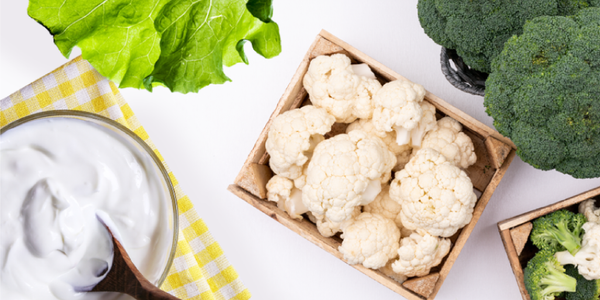Strengthen Your Health From Within: The Power of a Balanced Microbiota

Did you know that your intestinal health is closely linked to your immune system? It turns out that the health of your gut plays a crucial role in your immune system, affecting everything from your ability to fight off colds to your daily mood. That's right, that not-so-glamorous organ actually has a surprisingly profound impact on your overall health. So if you've ever hesitated to pay attention to your gut health, now is the time to do it!
"Good gut health is related to the health of almost every other organ," Dr Megan Rossi, also known as The Gut Health Doctor, told the BBC.
What is the Intestinal Microbiota?
Imagine your gut as a vibrant ecosystem full of life. The intestinal microbiota, made up of trillions of microorganisms, including beneficial bacteria, viruses and fungi, forms an active community in your digestive tract. These microorganisms play a crucial role in the digestion of food, the absorption of nutrients and, surprisingly, in the functioning of your immune system.
The number of these microorganisms in your body is approximately 1.3 times greater than the number of normal cells. The relationship between the microbiome and the body is currently being studied, and the countless effects it has on our health are being discovered.
The intestinal microbiota is essential for digestion, the regulation of the immune system and our general health. An altered microbiota has been linked to several disorders, such as inflammatory bowel disease or irritable bowel syndrome, among others.
Some of the microorganisms that make up the microbiota are especially "good" and, being more numerous, they manage to control others that have more aggressive behavior. Maintaining that balance between beneficial and harmful microorganisms is crucial for optimal intestinal health.
Relationship Between the Intestinal Microbiota and the Immune System
Now, let's explore the relationship between the intestinal microbiota and the immune system: Your immune system is your personal shield against diseases and pathogens. Surprisingly, the health of your gut microbiota and your immune system are closely connected. When your microbiota is balanced and healthy, your immune system works more efficiently, protecting you against disease.
The microbiota not only influences your ability to go to the bathroom regularly, but it also performs a variety of essential functions. From helping to metabolize nutrients to protecting against gut infections, the microbiota has a significant impact on your gut and overall health. In addition, it plays a crucial role in the development and strengthening of your natural defenses.
It is crucial to maintain a healthy balance in your intestinal microbiota. However, several factors can upset this delicate balance, from a low-fiber diet to the type of birth you had. Fortunately, even if you didn't have the opportunity to develop a healthy microbiota in childhood, you can still work to improve it and promote beneficial gut flora.
How to Heal the Intestinal Microbiota
Now, the million dollar question: how can you heal your intestinal microbiota and strengthen your immune system? Here are some practical tips:
Take care of your diet: There are foods and habits that favor the growth of "good" bacteria in the intestine so that they can combat the "bad" ones, ensuring a perfect balance of the microbiota or intestinal flora that reinforces your defenses and your health.
Eat a wide and varied range of plant-based foods. "I recommend about 30 'plant spots' per week," stresses Dr. Megan Rossi, which means 30 different plant foods, including fruits, vegetables, whole grains, legumes, nuts, seeds, herbs and spices. These foods “feed” the beneficial bacteria in your gut, promoting a healthy balance in your microbiota.
Add garlic and onion to your recipes whenever you can. The most interesting compound for the microbiota is fructan, which we also find in asparagus, artichoke, chicory, cabbage, cauliflower, broccoli and beets.
On the other hand, it incorporates fermented foods. Fermented cabbage or sauerkraut, pickles, kefir, yogurt, kombucha tea, miso (a soy paste to which a mushroom is added) or tempeh (also based on soy or legumes) are good examples. All of them promote the formation of anti-inflammatory substances in the intestine, help regulate the immune system and from them we obtain amino acids, vitamins and other nutritional substances.
Reduce stress: Chronic stress can have a negative impact on your intestinal microbiota. Stress affects the entire body like a bomb, including our intestine, because it robs it of its natural defenses, promotes inflammation and ends up unbalancing the entire digestive system.
Stress affects the frequency of going to the bathroom, causing constipation, but also periods of diarrhea, or persistent and strange flatulence. This happens to us because stress irritates our intestines and negatively impacts our bacteria.
Consume probiotics: Probiotics are live microorganisms that, taken in adequate quantities, are beneficial because they help us fight and prevent intestinal diseases, irritable colon and genital infections naturally. These bacteria are responsible for maintaining the pH of the area, which is the main defense system. This is why it is recommended to consume probiotics when we are taking high doses of antibiotics.
Try our Zenbiotic that enhances the health of your intimate area as well as the digestive area while taking care of your entire body's immune system. Antibiotics decrease the level and diversity of the microbiota, reducing the effectiveness of the immune response.
Consider CBD : If you are looking for additional support for your intestinal health, CBD could be an option to consider. One or two daily droppers of CBD extract, like our CBD Zen , is proven to help reduce stress in your life and regulate your mood.
Some preliminary studies suggest that CBD could help reduce inflammation in the gut and modulate immune system function, which could positively influence the health of the intestinal microbiota.
Maintaining a healthy intestinal microbiota not only benefits your immune system, but also your overall health! With a balanced microbiota, you can experience:
• Fewer digestive problems, such as bloating and constipation.
• More energy and vitality in your daily life.
• More radiant and healthy skin.
• Improvements in your mood and emotional well-being.

Dear friend, do not lose sight of your intestinal microbiota as a fundamental part of your health and well-being. By taking care of it and strengthening it, you are investing in your immunity and your quality of life in the long term. Consider incorporating simple changes, such as a balanced diet and stress reduction, as well as supplementing with CBD extract .
Always remember to speak with a health professional before making any significant changes to your lifestyle. Always pay attention to your habits, your intestinal health and strengthen your immune system!
Sources consulted
Impact of the Microbiome on the Immune System
Your Gut Microbiome: How To Improve It, Its Effects on the Immune System, and More
https://www.mskcc.org/news/your-gut-microbiome-how-improve-it-its-effects-immune-system-and-more
Intestinal microbiota: the foods and habits that take care of it the most
What to eat (and what not to) to improve the health of your intestinal bacteria



Leave a comment